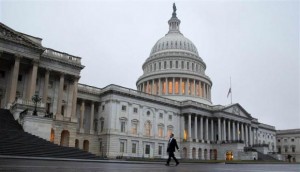
A man walks past the Capitol Building in Washington December 17, 2012.
Credit: Reuters/Joshua Roberts
(Reuters) – The U.S. House of Representatives narrowly approved a one-year extension of federal borrowing authority on Tuesday after Republicans caved into President Barack Obama’s demands to allow a debt limit increase without any conditions.
The 221-201 vote, carried mainly by Democrats, marked a dramatic shift from the confrontational fiscal tactics House Republicans have used over the past three years, culminating in last October’s 16-day government shutdown.
It came after House Republicans repudiated House Speaker John Boehner’s latest plan to link an increase in the $17.2 trillion borrowing cap to a repeal of planned cuts to military pensions.
Although Boehner called his decision to advance a “clean” debt limit a “disappointing moment,” it sets aside a difficult and divisive issue until after the 2014 congressional elections in November, allowing Republicans to focus their campaign efforts on the rocky launch of Obama’s healthcare reform law.
The White House hailed the House vote as “a positive step in moving away from the political brinkmanship that’s a needless drag on our economy.”
Democrats provided most of the “yes” votes on the debt limit increase, which was hastily attached to a measure renaming an air traffic control center in Nashua, New Hampshire. There were 193 Democrats who voted yes, versus just 28 Republicans, who wanted to pin blame on Obama’s refusal to negotiate.
“He will not engage in our long-term spending problem,” Boehner told reporters earlier on Tuesday. “So let his party give him the debt ceiling increase that he wants.”
The Democratic-controlled Senate was likely to begin consideration of the measure on Wednesday. But Republican Senator Ted Cruz, a conservative Tea Party favorite, said on Tuesday night he would insist on a 60-vote threshold for the debt ceiling measure to pass the Senate. That would mean at least five Republicans would need to join the Democrats, who control 55 votes, for the measure to pass the chamber.
Senate Republican Whip John Cornyn said earlier on Tuesday there were “probably not” five Republican votes in the Senate for a clean debt ceiling increase. But Senator Dick Durbin, the second-ranking Democrat in the chamber, voiced optimism there would be 60 yes votes if needed.
Senate passage this week would buy financial markets considerable breathing room before February 27, when the U.S. Treasury expects to exhaust existing borrowing capacity, putting federal payments at risk.
Without an increase in the statutory debt limit, the U.S. government would soon default on some of its obligations and have to shut down some programs, a historic move that would likely cause market turmoil.
U.S. stocks reacted mildly to news of the House Republican decision to drop any conditions on the debt limit. Wall Street stocks rose for a fourth session as traders focused most of their attention on Federal Reserve Chair Janet Yellen’s first congressional testimony.
“It was a minor worry that an agreement wouldn’t come. It’s not a big plus (for the market), but I’m glad this happened,” said John Manley, chief equity strategist at Wells Fargo Funds Management in New York.
As stocks rose, bond prices retreated.








